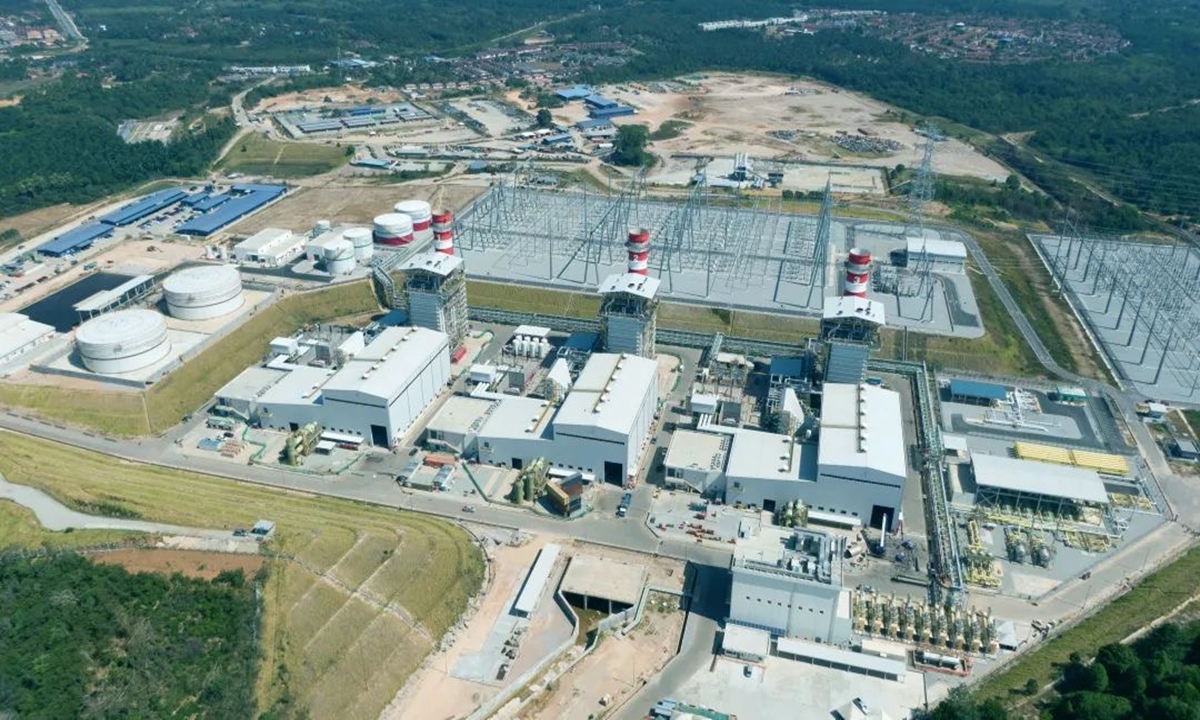Developing countries get speeches from US, real infrastructure building from China

A scene of the Central Business District project in Egypt's new administrative capital in east of Cairo, Egypt, on July 19, 2022. The project is implemented by China State Construction Engineering Corporation. Photo: Xinhua
Editor's Note:This year marks the 10th anniversary of the Belt and Road Initiative (BRI) proposed by Chinese President Xi Jinping. Through the lens of foreign pundits, we take a look at tenth years of the BRI - how it achieves win-win cooperation between China and countries along the Belt and Road and how it increases people's sense of fulfillment in these countries.
Peter Walker (Walker), speaker on China-US relations and author of the book Powerful, Different, Equal: Overcoming the misconceptions and differences between China and the US, shared with Global Times (GT) reporter Qian Jiayin his view on the development of the BRI in China-US relations.
This is the tenth piece of the series.
GT: How do you evaluate the development of the BRI over the past decade?
Walker: I think that the goal of China from the beginning has been to improve its influence in developing countries. If you look at economic growth and population growth, the future is going to be increasingly driven by what happens in developing countries. So I think China is just being strategic and saying we want to strengthen our position with those countries that are going to play an increasingly important role over time. I would say that the results to date have been reasonably effective.
I think when China launched the BRI, its intention was not just using rhetoric in the developing world but actually improving the lives of people there. It has been very effective. In the early days, there were problems where money was lent to countries that did not have the ability to repay. And the US coined the phrase "debt trap." But my own feeling is that anytime you launch a program of that magnitude and scale, you're going to have growing pains.
The US came out a couple of years ago and basically said, we're not going to be lending to companies in countries that don't have the ability to repay; We're not going to lend to countries that are going to create environmental problems. But if you step back from the BRI and look at the big picture, China has made enormous contributions to the infrastructure development of many developing countries. Those countries very much appreciate it. The BRI hasn't always been a smooth ride, so there have been bumps on the road, but China has responded to them, and I think the BRI is on a reasonably good track.
GT: The US often portrays China's implementation of the BRI as a means to compete for regional influence and spheres of influence. What is your opinion on this viewpoint?
Peter Walker: I think the US needs to move out of the current Cold War mentality, which I call a zero-sum mentality. So what we ultimately need is for both the US and China to look practically at their relationships and be very clear about what they want on each side.
And once both sides have that (understanding), we have the basis for a legitimate negotiation. Even that's not going to happen on the US side until the election is over. But I think it could happen. China has always been practical and not dogmatic about what it wants and what it's willing to give up. The onus is on the US to respond to this, whether it's through environmental negotiations, sanctions, tariffs or being militaristic in terms of what's going on in Taiwan [question] and the South China Sea. All of those things leave room for compromise on both sides.
So the hope would be that after the election is completed, both sides will come forward with what they want, and the tradeoffs will start to take place.
GT: The Chinese side has repeatedly stated that it will not challenge or replace the US, but it seems that the US does not see it that way and it regards China's strategic intentions, including that of the BRI, as challenges. How do you view the US' misunderstanding of China's strategic intentions? What has led to the misunderstanding of the BRI by the US?
Walker: I think that China wanted to improve its standing with the rest of the world, especially with respect to developing countries. The BRI is actually influencing increasingly how developing countries feel about where they stand with the US and China in terms of influence. Europe is likely to remain indefinitely very much aligned with the US, as we see from NATO, which has been very, very pro-US by definition.
There will always be some level of military tension between the US and China because security for both sides is the No.1 issue. Frankly, I don't think you're going to see a lot of compromise on that side. But what you could do, is make it crystal clear what it's willing to do and not willing to do with respect to things like chips. There are obviously nanochips that can be very useful from a military point of view because they enable you to provide guidance to weapons. But that's a very small part of the chip issue. In the commercial field, the US and China can conduct win-win cooperation within the scope of both parties' security. So I think the ball is in the hands of the US to basically decide what they're going to do to counter that.
GT: To counter the BRI, the US has proposed several concepts, such as the Blue Dot Network and Build Back Better World, but it seems that they have not brought about the connectivity and economic cooperation advocated by the BRI. Why is that?
Walker: Honestly, when you look at the level of foreign aid that the US provides, it is inconsequential. All the US can do is go to developing countries and say, we don't want you doing business with China. But the reality is, if you're a developing country and all you get are speeches from America, and what you're getting from China is real infrastructure building, over time, you've got to tilt increasingly toward China's position. If the US wants to change that, they're not going to do it with words, they're going to have to do it by actually providing tangible support to developing countries. And so far, we haven't been willing to do that.
Actually, the US can do a lot on economic issues, climate issues, and a number of other global issues like pandemics. With all of those things, the US could make real compromises. If you take an area like pandemics, nobody wants the world to be unprepared when the next COVID happens. If the US and China could share their data and their vaccines, that would be a win for everyone. I think that can be defined in a much tighter way that would enable both sides to feel comfortable and then go at pure win-win when you look at the economy and the other issues.
But to me, the outcome is fairly predictable. China has added real value, and the US has not.



